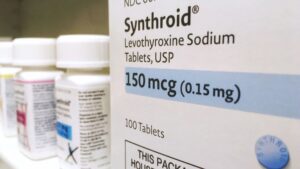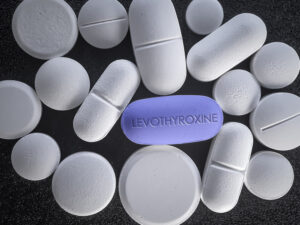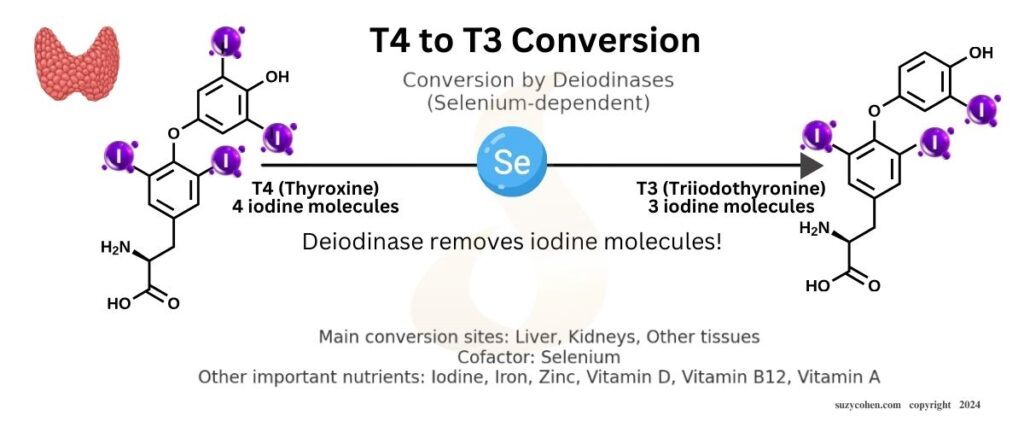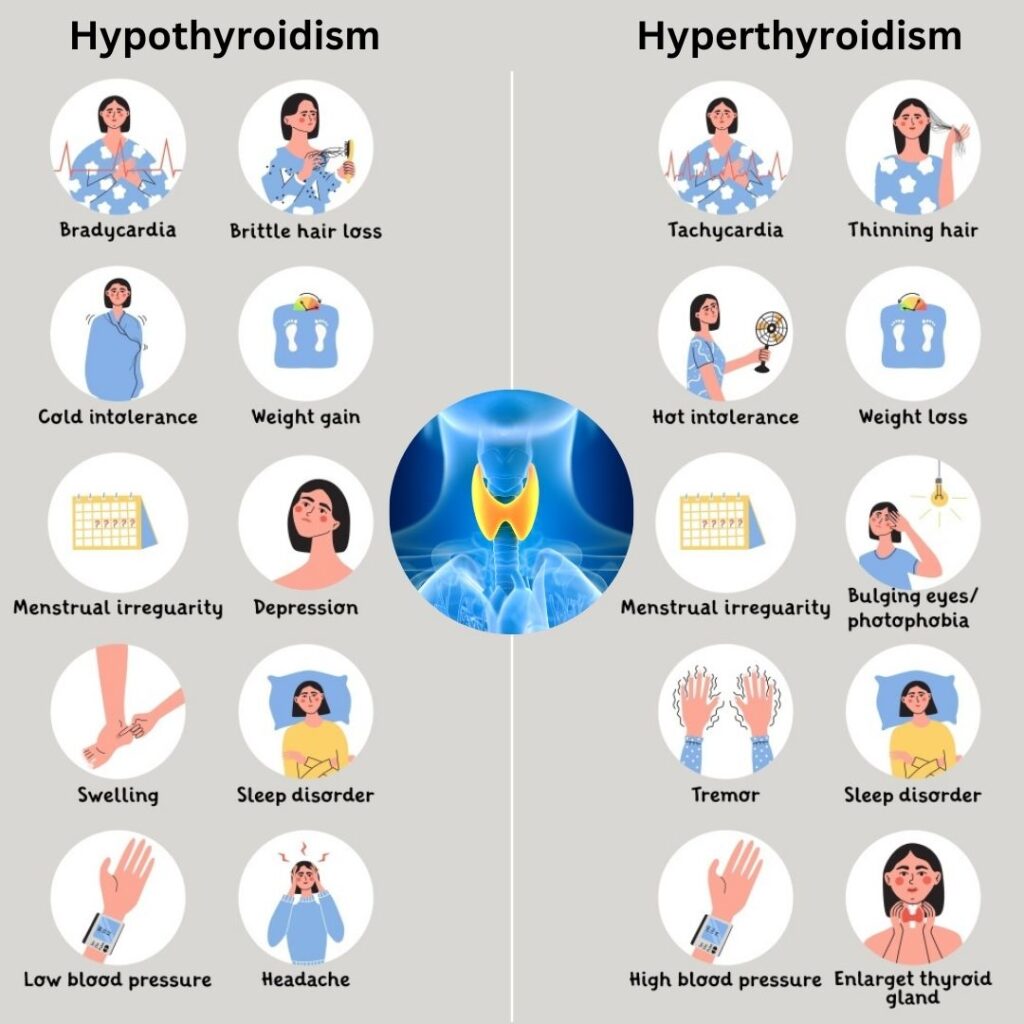What's On This Page?
ToggleWelcome to a guide designed for those who, like millions around the world, depend on thyroid medication to manage their thyroid function effectively. Whether you’ve been prescribed levothyroxine, the generic powerhouse, or natural desiccated thyroid (NDT) drugs like Armour Thyroid or Nature-Throid, understanding how to take your medication correctly is pivotal for your health and well-being.
When it comes to managing thyroid health, understanding how to properly take your thyroid medication is crucial. This isn’t just about remembering to take your pill – it’s about how what you eat or drink affects how your medication works. The form of your medication can affect absorption. Liquid and gel cap formulations may be absorbed differently than traditional tablets.

Whether you’re on Levothyroxine, a synthetic T4 (Synthroid®) or a natural desiccated thyroid (NDT) product like Armour® which contains both T3 and T4, the nuances of medication management can significantly impact your treatment’s effectiveness and ultimately how you feel. If you take Cytomel® (Liothyronine) please scroll down to see my special section on this T3 medication. Also, if you don’t want too much detail and your brain is tired today, just scroll to the bottom where I’ve made a succinct list of 5 Do’s and Don’ts for you.
Introduction to Thyroid Medication
The thyroid gland plays a pivotal role in regulating numerous metabolic processes throughout the body. Medications like Levothyroxine (Synthroid, Levoxyl, and others) and NDT (Armour Thyroid, Nature-Throid) are prescribed to manage hypothyroidism, a condition where the thyroid does not produce enough hormones.
Ongoing research continues to evaluate the effectiveness of combination therapy using both levothyroxine and liothyronine for patients who do not feel well on levothyroxine alone, although this remains somewhat controversial with mixed results.

Recent studies (current to mid-2024) suggest that while many people do well on standard levothyroxine (T4) therapy, a subset of patients with certain genetic SNPs might benefit from adding liothyronine (Cytomel®) to their treatment regimen or adjusting the timing and dietary interactions more precisely to their individual metabolic needs. Scroll down to read more about that specific medication.
Understanding the optimal way to take your thyroid medication can make a significant difference in your treatment.
Let’s get into the specifics:
-
Timing and Consistency are Key
The effectiveness of thyroid medication can hinge on the timing of your dose. You might want to take 5 minutes later on to read my article on timing of all sorts of medicines: Chronotherapy: Timing Of These 7 Medication Matters Greatly!
Here are essential tips to consider specifically for thyroid medication:
- Morning Intake: It’s generally recommended to take your thyroid medication first thing in the morning. This helps maintain a consistent level of thyroid hormones in your system. Keep the medication at your bedside, or on the bathroom counter.
- Consistent Schedule: Take your medication at the same time every day. Consistency helps keep your thyroid levels stable. Morning is perfect.
- Fasting State: Food can interfere with the absorption of your medication. So take your medication on an empty stomach, ideally 30-60 minutes before breakfast. Always take your medication with a full glass of water.
- Levothyroxine: The best practice is to take levothyroxine first thing in the morning, ideally 30 to 60 minutes before breakfast. The reason for this timing is to prevent any food from affecting its absorption.
- NDT (Armour Thyroid, Nature-Throid): Similar to levothyroxine, NDT should be taken on an empty stomach. Some patients prefer splitting their dose, taking half in the morning and half in the early afternoon to better mimic the body’s natural rhythm of thyroid hormone production.

-
Diet: Foods and Drinks to Avoid with Thyroid Medication
Your diet plays a significant role in the effectiveness of your thyroid medication. Many people don’t realize this, but it’s VERY important.
Here’s what you need to know:
- High-Fiber Foods: Although fiber is essential for a healthy diet, high amounts can impede the absorption of thyroid medication. If your diet is rich in fiber, consider a timing gap of several hours between your fiber intake and medication. Such foods include beans, lentils, popcorn, oat bran muffins, dried fruit, broccoli, raspberries and spaghetti.
- Soy Products: Soy can interfere with thyroid medication absorption. These include tofu, soy milk, soy-based protein powders, and tempeh. Soy may hinder the absorption of thyroid medication. Soybeans are goitrogenic and to learn more, you can read this ARTICLE. If you consume soy products, maintain a few hours’ gap from your medication time. Read my other article, Soy Foods And Thyroid Disease: 7 Ways To Navigate The Impact.
- Coffee and Espresso: Caffeine can significantly reduce the absorption efficiency of thyroid medication. Wait at least one hour after taking your medication before having a caffeinated drink.
-
Mineral Interactions: What to Avoid and When
Certain minerals can impact how well your body absorbs thyroid medication:
- Iron and Calcium: These minerals can severely affect the absorption of thyroid medication. It’s best to take any supplements containing iron or calcium at least 4 hours before or after your thyroid medication.
- Magnesium and Aluminum: Found in some antacids such as Mylanta® and Maalox®, these types of heartburn meds can also interfere with thyroid medication absorption. Keep a similar gap as with iron and calcium.
-
Drug Interactions with Thyroid Medication
Drug Interactions to Be Aware Of
Certain medications can have serious interactions with thyroid medications. Here are key ones to avoid:
- Bisphosphonates (used for osteoporosis like Fosamax®): These should be taken several hours apart from thyroid medication to avoid reduced effectiveness of both drugs.
- Antidepressants: Some antidepressants can increase the body’s metabolism of thyroid medication, necessitating adjustments in dosage.
- Blood Thinners (ie warfarin): Thyroid medications can enhance the effect of blood thinners, potentially leading to bleeding risks. Monitoring and dosage adjustments may be necessary.
- Antacids (ie Maalox®): These alter pH in the stomach reducing effectiveness of thyroid pills, all of them. Space your thyroid medication about two hours away from acid blockers.

-
Fruit is a Consideration!
- Grapefruit: Like many other medications, grapefruit and grapefruit juice can alter the metabolism of thyroid medications. It’s wise to avoid grapefruit altogether when on thyroid treatment.
The bioavailability of thyroid medication (the amount that enters the bloodstream) can be significantly reduced, reducing the benefits of therapy. If you must eat grapefruit, don’t worry too much because your doctor will just slightly raise the dosage of your medication. You may want to read my other article, A Grapefruit A Day Isn’t Necessarily Bad Unless You Take These 10 Medications.
Supplements that May Enhance Your Thyroid Medication Therapy
While some minerals and vitamins should be timed carefully around your thyroid medication, others can be taken without regard to your medication, and they may be beneficial:
- Vitamin D: Often, people with thyroid issues have low vitamin D levels. Supplementing correctly can support someone with thyroid concerns because it help with antibody levels, and immune function.*
- Selenium: This antioxidant mineral can support efficient thyroid function and is perfectly safe to take along with your thyroid medication. It supports T4 activation and antibody levels.* I put some selenium in HashiScript® – a patented thyroid support formula.
Liothyronine (Cytomel)
Let’s talk about the essentials for dosing Cytomel (liothyronine), particularly for those managing hypothyroidism. Starting doses for adults typically begin at 25 micrograms (mcg) per day. Your doctor may adjust this amount gradually—increasing by about 25 mcg at intervals—based on how well your body responds, with a maintenance dose generally not exceeding 75 mcg daily.
For seniors or individuals with heart conditions, the approach is more conservative, starting as low as 5 mcg daily, increasing cautiously to suit individual tolerance and response.
For children with hypothyroidism, the dosing starts at a minimal 5 mcg daily, adjusted according to how effectively the symptoms are managed. Younger children might need to increase their dose more frequently to keep up with their body’s needs as they grow.
Remember, Cytomel is a potent medication, and its dosing needs careful adjustment monitored by regular thyroid function tests to ensure the best balance for your health. Always follow your healthcare provider’s instructions closely to tailor the therapy to your specific needs.
Liothyronine is a synthetic form of the thyroid hormone triiodothyronine (T3). It is used less frequently than levothyroxine (T4) because the body naturally converts T4 to T3. However, it is prescribed in certain cases, such as in patients who do not convert T4 to T3 efficiently.

One more thing – the guidelines for taking liothyronine regarding timing (ideally on an empty stomach), dietary, and mineral interactions are similar to those for levothyroxine (see above). However, because of its faster onset of action and shorter half-life, liothyronine may require multiple daily doses to maintain stable blood levels, and make you feel well all day long until bedtime.
As you know this is a T3 type of thyroid medication, so it’s more biologically active. It’s what T4 converts to T3. And because T3 has a more immediate effect on metabolism than NDT drugs and T4 drugs like levothyroxine, you have to pay closer attention to your body to avoid symptoms of over-replacement. Symptoms of excessive thyroid (termed hyperthyroid) include heart palpitations, rapid weight loss, and anxiety.

5 Important Do’s and Don’ts if you take Thyroid Medication
Do’s:
- Take Your Pills Consistently: Take your thyroid medication at the same time every day, preferably on an empty stomach, to maintain consistent hormone levels.
- Follow Doctor’s Instructions: Always follow your doctor’s instructions regarding dosage and timing of medication.
- Wait Before Eating: Wait at least 30 minutes to 1 hour before eating after taking your medication, as food can interfere with absorption.
- Stay Consistent: Stick with the same brand of medication unless directed otherwise by your doctor, as different brands may have varying potency.
- Keep Track of Symptoms: Monitor your symptoms and discuss any changes with your doctor to adjust medication dosage if necessary.
Don’ts:
- Don’t Take with Certain Foods or Supplements: Avoid taking your thyroid medication with calcium, iron supplements, or high-fiber foods, as they can interfere with absorption.
- Don’t Miss It: Try not to skip doses of your medication, as it can disrupt hormone levels and lead to symptoms.
- Avoid Drugs that Interact: Some medications, such as antacids, proton pump inhibitors, and certain antidepressants, can interfere with thyroid medication absorption. Consult your doctor before taking new medications.
- Don’t Change Dosage Without Consulting Your Doctor: Avoid adjusting your medication dosage on your own without consulting your doctor, as it can lead to imbalances in hormone levels.
- Don’t Overlook Symptoms: If you experience new or worsening symptoms, don’t ignore them. Discuss them with your doctor to determine if adjustments to your medication are needed.
Final Thoughts
Taking thyroid medication correctly is not just about managing your thyroid disorder; it’s about integrating this treatment effectively into your lifestyle for optimal health and well-being. Remember, consistency is key, not only in how you take your medication but also in monitoring your thyroid function with your healthcare provider. Adjustments might be necessary as your body’s needs change over time, so regular communication with your healthcare provider is essential. By understanding and managing these aspects, you’re taking a significant step towards better health management and a fuller, more vibrant life.

Suzy Cohen, has been a licensed pharmacist for over 30 years and believes the best approach to chronic illness is a combination of natural medicine and conventional. She founded her own dietary supplement company specializing in custom-formulas, some of which have patents. With a special focus on functional medicine, thyroid health and drug nutrient depletion, Suzy is the author of several related books including Thyroid Healthy, Drug Muggers, Diabetes Without Drugs, and a nationally syndicated column.


